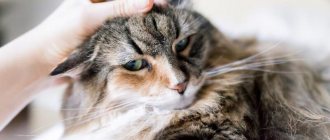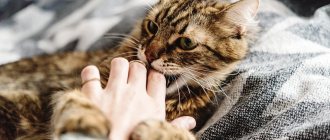Why do cats bite?
Pets rarely become aggressive for no reason; everything happens for a reason. For cats, a bite is a manifestation of a hunting or protective instinct. It can manifest itself due to fear, pain, stress, dissatisfaction or under the influence of external factors.
Most often, cats that live outside are bitten. They are not used to contact with a person or have negative experience of such communication. Therefore, they can respond with aggression if they are picked up or stroked. This is how they protect themselves and protect their personal space.
Sometimes this behavior is related to the pet’s character and temperament, gender and age. Bengal, Abyssinian and Pallas' cat cats are considered the most biting. They tend to be dominant and show by their bites that they are in charge. All cats are very independent, but some dislike being touched more than others.
Aggression can also manifest itself in cats during the period of sexual heat. Cats do not allow themselves to be touched and bite during pregnancy. And kittens use bites to learn about the world and try to scratch their gums.
Often cats want to attract the owner’s attention with this behavior, to show that they need something. They may bite if they want to eat or drink if they feel uncomfortable. This is how they show that they are bored and lack attention; they can take revenge for past grievances. Sometimes cats bite your hand gently, without causing pain. This is what they do with kittens. This is an expression of trust and love.
Idiopathic aggression
Unfortunately, there are cases when cats violently attack their owners without any obvious reason. If aggressive behavior does not fit into the above schemes of active aggression or defensive reaction to pathophysiological disorders, it may be idiopathic aggression. It is quite difficult to accurately establish that an animal suffers from this particular pathology, since an explosive reaction can be caused by severe stress, fear, a change in the usual environment and many other reasons.
If the motivation for such behavior cannot be determined, then the animals have to be euthanized, because such mental disorders cannot be corrected. However, this decision should be approached with the utmost caution, because sudden and vicious attacks may still be provoked by something, and the owners simply could not understand the reasons for the unexpected aggression.
Reasons why a cat bites while being petted
For many owners, this situation is incomprehensible when a cat calmly accepts affection, is relaxed, and then suddenly suddenly changes behavior and begins to bite. In animal psychology there is even such a concept: “aggression provoked by affection.” This happens for several reasons.
Pet doesn't like affection
Not all animals like to be touched. Perhaps the cat came to the person just to warm up, it doesn’t need contact, but they start petting it. Or they took her by force. This can cause aggression in your pet. In addition, he may simply be in a bad mood and not in the mood for affection.
It also often happens that a cat calmly accepted affection for some time, and then she got tired of it. Not everyone likes long strokes. It is possible that friction has created static electricity, which is causing discomfort to your pet. Or the cat began to perceive prolonged affection as a person’s desire to dominate and protests against this.
Stroking is unpleasant
Cats don't like all touches. They usually enjoy stroking the head, back, neck, scratching the chin, cheeks, and chest. Most cats do not tolerate touching their bellies and paws. If the owner touches forbidden places during caressing, he receives a bite in response. Unpleasant sensations can also be caused by stroking against the grain, too rough and sudden movements, or touching the tail.
Touching hurts
Sometimes a bite is a reaction to pain. Perhaps such sensations were caused by a person with careless movements or the cat is unwell. She may be worried about injuries or diseases of internal organs. This condition is easy to determine: the pet reacts sharply to touching a certain place, flinches, meows and bites. If this behavior occurs, it is recommended to contact a veterinarian. And kittens try to get rid of pain and discomfort due to teething by biting their hands.
Reaction to stress
The bite may be a reaction to fear or stress. If a cat falls asleep while being petted, it may be startled by a sharp sound. Defending herself while asleep, she attacks what is closer - the person’s hand. This can also happen in an uncomfortable environment for the animal, after stress. Perhaps he is irritated by some sound or smell, the presence of a stranger.
If the owner scolded the cat, punished him or did not give him treats, she may later take revenge on him by biting him on the hand. This is how she shows her dissatisfaction with the lack of attention and entertainment. Some pets take revenge because they accidentally stepped on their tail, were not allowed on the table, or were kicked out of the room.
Reaction to odors
Cats are very sensitive to smells. If a person's hands smell of perfume or spices, caresses will be unpleasant to her. This reaction can also occur if the owner touched someone else's animal. Its smell remains on the hands, which cats sense acutely. The affection will most likely be perceived negatively by her.
Negative associations
Some owners, when performing hygiene procedures that are unpleasant for the cat, such as trimming claws, injections or bathing, look at it. And in the future, the pet will have an association that if it is petted, something unpleasant will happen.
Playfulness
Often relaxation during affection is replaced by a playful mood. At this moment, the pet grabs the person’s hand with its front paws, and begins to kick strongly with its hind paws. At the same time he bites his hand. At this time, the cat may purr, and the bites are usually not strong; the animals understand that this is a game. A pet that has been raised incorrectly may bite hard. If a kitten was allowed to behave this way, it will behave the same way as an adult.
Sometimes cats show their love in this way. They may lick your hand, then bite and lick again, just like they do with kittens. Such behavior is an expression of complete trust in a person.
Token of affection
Most people know that purring and stomping around are signs of a happy, content cat. However, this is not the only behavior your cat will exhibit if she loves you.
Cats groom each other as a sign of love. This behavior, known as grooming, can include licking and biting.
If your cat starts nibbling on your chin, especially if it's preceded by several licks, it could just be grooming.
How to prevent bites
If you understand why a cat bites your hands when you pet it, you can prevent it. You should try not to force the cat to caress you, never forcefully pick him up or hold him if he wants to leave. You can check whether the pet is disposed towards the contact by extending your hand towards it. If he withdraws or does not react, it is better not to pick him up.
It is not recommended to pet a cat when it is eating, sitting on a tray, or licking itself. You cannot touch a sleeping animal; this is perceived as a violation of personal space. And if you pet your pet after punishment, it will be perceived as encouragement for incorrect behavior. The best time to pet him is after playing.
You should try not to come into contact with the cat if your hands are smeared with cream or after using perfume. Most likely, he will react negatively to strong odors. You should only pet your cat in places that he allows you to touch. Try not to touch the belly, tail, paws. The caress should not be long - no more than 3-5 minutes.
You can avoid being bitten by carefully monitoring your cat. She usually changes her behavior before she uses her teeth. You may notice the following signs:
- the cat stops purring;
- suddenly tenses and freezes;
- pupils dilate;
- the skin and fur on the back twitches;
- the tail trembles and begins to twitch nervously;
- ears pressed to the head;
- the body tenses;
- You can hear rumbling and hissing.
If you notice this behavior, it is better to stop petting your pet and leave it alone. Then bites and conflict can be avoided. It is also necessary to take into account the cat’s character traits. If he is unsociable and does not like touching, it is better not to touch him again.
Use positive reinforcement
The goal in such situations is to teach the cat that everything pleasant (play, food, attention) must be earned, and that you are in command. Then rewards and resources can be used to motivate the cat to respond correctly.
For example, teach your cat to “come” by using lunchtime to its advantage.
Before your cat receives the food bowl, say “let's go” in a cheerful, loud voice, then turn on the can opener, shake the food bag, or grab a treat jar.
Your cat has already learned these cues and the time to run to her bowl, so you simply teach her to associate the command with an action. When your cat obeys, reward him with a treat or a bowl of food.
You can also clicker train your cat by pairing food rewards with a clicker that makes noise. Eventually your cat will begin to think of the clicker as a reward, and treats may no longer be necessary.
What to do if a cat bites while petting
The correct reaction of the owner determines whether the cat will continue to bite and whether this behavior will be repeated. You cannot respond with aggression, scream or hit your pet. In response, he will begin to bite even harder or get scared. Resentment will cause distrust of the owner, and this behavior will be repeated.
If you notice a change in mood, it is better to immediately stop the affection and leave. You can prevent a bite by strictly saying “no” or hissing. Another way is to redirect your pet’s attention by offering him a toy. If it didn’t work out, and the cat still bit, it is recommended:
- lightly click the pet on the nose to distract it from your hands, cause discomfort, but not pain;
- lift them by the scruff of the neck and hold them a little, in this position the cats calm down, because this is how their mother raised them;
- A sharp sound will help to switch the animal’s attention: whistling, clapping your hands, hitting the furniture with your hand;
- Sprinkle water on the cat - it will immediately begin to lick the wet fur;
- stop petting, leave silently, deprive the animal of attention, this will let him understand that such behavior is unacceptable.
But these methods are not suitable if the cause of aggressive behavior is pain, stress or fear. In these cases, you need to calm the animal with a calm, gentle voice, try to eliminate sources of irritation, and provide assistance.
Aggression during play
This form of feline aggression is usually seen in young, extremely active and playful cats. The reason for an attack could be the movement of a leg under a blanket, the waving of a hand, or simply moving around the house in close proximity to the animal.
There may be several possible causative factors why a cat bites and lunges:
- Hereditary predisposition. Kittens' activity levels can be influenced by the genes of their parents, so they can be either hyperactive or calm due to their nature.
- Inappropriate content. Cats can demonstrate increased physical and play activity when they are left alone for a long time. By playing and attacking their owners, animals make up for the lack of communication and emotions.
- Encouraging owners. Often, owners themselves provoke aggressive behavior in their pets by teasing them, practicing rough games and subsequent physical punishment. With this manner of communication, you should not then wonder why the cat bites.
- Wrong upbringing. A too loyal attitude towards a cat’s pranks leads to the fact that aggression becomes a trait of his character, so this problem must be dealt with from childhood.
How to stop a cat from biting
If this behavior is related to the character and temperament of the cat, it is difficult to change it. You need to accept your pet as he is. It is recommended to study what the cat likes and what touches it reacts negatively to.
In most cases, aggression can be prevented if you raise your kitten correctly. In order for him to normally perceive communication with a person, early socialization is necessary. You need to play with the kitten, introduce it to other people and sounds. He must understand that nothing threatens him in the house.
Your kitten should have plenty of toys that he can bite and chew on. It is advisable to arrange a place for him where he can jump, run, and play. If he bites during play, you need to leave and deprive the kitten of attention. He will eventually understand the connection between biting and lack of play. The earlier training begins, the greater the chance that he will not bite as an adult.
By learning the reasons why a cat begins to bite in response to affection, you can prevent this behavior. Patience and love of the owner, attention to the needs and character traits of the animal will help maintain a good relationship and protect hands from bites.
Sign of stress or illness
If a cat is feeling stressed or unwell, she may be prone to showing signs of aggression, including biting. Your pet may want to be given more personal space.
In rare cases, a cat may even experience a condition known as hyperesthesia, where it is extremely sensitive to touch. In cats with hyperesthesia, the follicles are even more sensitive than normal. You may notice that your cat gets goosebumps when you stroke her back.











